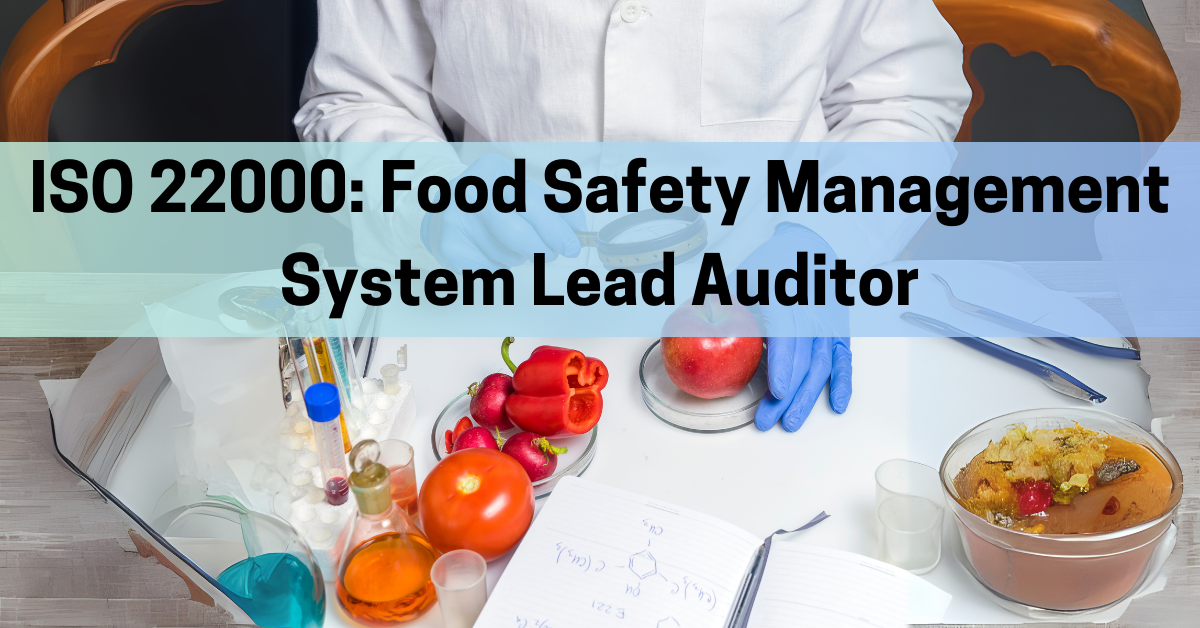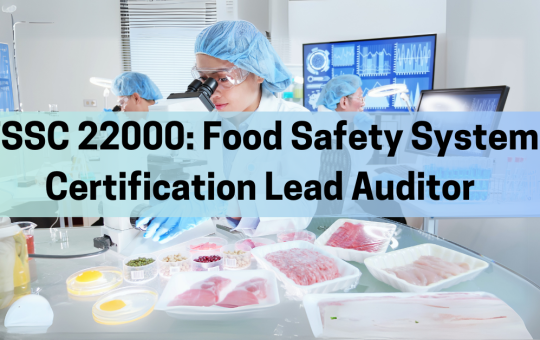
ISO 22000: Food Safety Management System Lead Auditor
- Global Recognition: Gain certification as a Lead Auditor in ISO 22000, recognized by organizations worldwide for ensuring food safety.
- Career Advancement: Open career opportunities in food safety auditing, management, and consulting.
- Expert Knowledge: Learn the principles, guidelines, and best practices for auditing food safety management systems.
- Contribute to Public Health: Play a key role in enhancing food safety practices that protect consumers globally.
- Access to Cutting-Edge Tools: Gain insights into the latest food safety trends, challenges, and audit methodologies.
- Understand the ISO 22000 standard and its application in food safety management.
- Plan, conduct, and report on ISO 22000 audits for food businesses.
- Evaluate the effectiveness of food safety management systems (FSMS) in compliance with ISO 22000.
- Assess food safety risks and determine corrective actions for non-compliance.
- Integrate Hazard Analysis and Critical Control Point (HACCP) principles with ISO 22000 audits.
- Implement strategies for continual improvement in food safety processes.
- Communicate audit findings effectively to management and stakeholders.
- Introduction to ISO 22000
- Overview of food safety management.
- Importance of ISO 22000 in the food industry.
- Key terms, principles, and benefits of ISO 22000.
- Food Safety Management System (FSMS)
- Structure and components of FSMS.
- Roles and responsibilities in implementing food safety systems.
- Integration of food safety policies with business operations.
- HACCP and Its Role in Food Safety
- Principles and application of HACCP.
- The role of HACCP in ISO 22000 food safety audits.
- Identifying and managing food safety hazards.
- Lead Auditor Role and Competencies
- Ethical and professional responsibilities.
- Audit planning, preparation, and execution.
- Managing audit teams and effective communication.
- Conducting the Audit
- Data collection, site inspections, and document review.
- Identifying non-conformities and risks.
- Interviewing key personnel and stakeholders.
- Audit Reporting and Follow-Up
- Writing clear and concise audit reports.
- Communicating audit findings and corrective actions.
- Implementing continuous improvement strategies post-audit.
- Risk Management in Food Safety
- Identifying potential risks in food safety operations.
- Assessing risk severity and impact.
- Developing risk mitigation plans and emergency procedures.
- Case Studies and Practical Exercises
- Real-life examples of ISO 22000 audits.
- Practical exercises on food safety risk assessment.
- Group discussions and interactive learning.
- Introduction to Food Safety Management Systems (FSMS)
- Importance of food safety in global trade and public health.
- Overview of the ISO 22000 standard and its structure.
- FSMS as a tool for improving food safety across the supply chain.
- ISO 22000: Key Principles and Requirements
- Understanding the key requirements of the ISO 22000 standard.
- The role of leadership in promoting food safety culture.
- Integration of HACCP principles into food safety systems.
- The Lead Auditor’s Role in Food Safety Audits
- Defining the responsibilities of a Lead Auditor.
- Competency requirements for effective auditing.
- Managing the audit process and ensuring a thorough examination.
- Audit Planning and Preparation
- Audit preparation techniques and defining scope.
- Developing audit schedules and methodologies.
- Risk-based audit planning and site selection.
- Conducting the Audit
- Techniques for gathering evidence, site inspections, and data collection.
- Identifying non-compliances and food safety risks.
- Interviewing staff and evaluating food safety practices.
- Audit Findings and Corrective Actions
- Documenting findings and audit observations.
- Communicating audit results to stakeholders.
- Creating corrective action plans for non-conformities.
- Risk Assessment and Hazard Control
- Identifying and assessing food safety risks in food production.
- Mitigating hazards using control measures.
- Ensuring food safety standards are met through continuous monitoring.
- Final Assessment and Certification Exam
- Final exam to assess learning outcomes and practical skills.
- Awarding certification to successful participants.
- Pursue Additional Certifications:
- ISO 9001 Quality Management System Auditor: Expand your auditing capabilities to broader quality management standards.
- ISO 14001 Environmental Management System Lead Auditor: Broaden your skills in environmental management alongside food safety.
- NEBOSH International Diploma in Occupational Health and Safety: Combine food safety management with occupational health and safety knowledge.
- Become a Food Safety Consultant:
- Help organizations in the food industry implement and improve ISO 22000 systems.
- Advise on food safety strategies, compliance, and risk management.
- Leadership Roles in Food Safety:
- Food Safety Manager: Take responsibility for overseeing food safety systems within food manufacturing or service organizations.
- Quality Assurance (QA) Manager: Lead quality assurance efforts in food production facilities, ensuring compliance with ISO 22000 and other relevant standards.
- Develop Expertise in Food Safety Compliance:
- Regulatory Affairs Specialist: Ensure food businesses comply with local and international food safety regulations.
- Risk Assessment Specialist: Work in risk management roles within food industries to identify and mitigate food safety risks.
- Join Professional Associations:
- Become a member of the International Register of Certificated Auditors (IRCA) or the Institute of Food Technologists (IFT) for networking, professional development, and staying updated on industry trends.
- Industry-Experienced Trainers: Learn from highly qualified Lead Auditors with practical industry experience in food safety management.
- Comprehensive Course Materials: Access to up-to-date resources, case studies, and audit templates for real-world learning.
- Globally Recognized Certification: Earn a certificate that is accepted worldwide and valued by employers in the food safety and quality management sectors.
- Interactive Learning Experience: Participate in hands-on audit simulations, group activities, and scenario-based exercises.
- Flexible Learning Options: Choose from online or in-person learning to suit your schedule and learning preferences.
Study Units:
- Introduction to ISO 22000
- Overview of food safety management.
- Importance of ISO 22000 in the food industry.
- Key terms, principles, and benefits of ISO 22000.
- Food Safety Management System (FSMS)
- Structure and components of FSMS.
- Roles and responsibilities in implementing food safety systems.
- Integration of food safety policies with business operations.
- HACCP and Its Role in Food Safety
- Principles and application of HACCP.
- The role of HACCP in ISO 22000 food safety audits.
- Identifying and managing food safety hazards.
- Lead Auditor Role and Competencies
- Ethical and professional responsibilities.
- Audit planning, preparation, and execution.
- Managing audit teams and effective communication.
- Conducting the Audit
- Data collection, site inspections, and document review.
- Identifying non-conformities and risks.
- Interviewing key personnel and stakeholders.
- Audit Reporting and Follow-Up
- Writing clear and concise audit reports.
- Communicating audit findings and corrective actions.
- Implementing continuous improvement strategies post-audit.
- Risk Management in Food Safety
- Identifying potential risks in food safety operations.
- Assessing risk severity and impact.
- Developing risk mitigation plans and emergency procedures.
- Case Studies and Practical Exercises
- Real-life examples of ISO 22000 audits.
- Practical exercises on food safety risk assessment.
- Group discussions and interactive learning.
Upon successful completion of this course, participants will be able to demonstrate the following professional competencies:
Audit Leadership:
Lead ISO 22000 food safety management system audits effectively in compliance with ISO 19011 auditing guidelines.Food Safety Risk Evaluation:
Identify, assess, and evaluate food safety hazards across the supply chain and verify control measures.System Implementation and Compliance:
Assess the effectiveness and conformity of FSMS with ISO 22000 requirements and legal food safety obligations.Corrective and Preventive Action:
Identify non-conformities, conduct root cause analysis, and recommend robust corrective and preventive measures.Audit Communication and Reporting:
Develop comprehensive audit reports, communicate findings clearly, and engage management effectively.HACCP and PRP Integration:
Apply HACCP principles and Pre-Requisite Programs (PRPs) within the ISO 22000 audit framework.Continuous Improvement Facilitation:
Support organizations in developing and sustaining a culture of continual improvement in food safety practices.Stakeholder and Team Management:
Coordinate audit teams efficiently and ensure effective communication among auditors, management, and operational staff.Cross-System Competency:
Integrate ISO 22000 audits with other management systems such as ISO 9001, ISO 14001, and FSSC 22000 for comprehensive compliance.
This course is designed for professionals involved in food production, processing, distribution, or auditing who wish to gain advanced expertise in auditing food safety management systems. It is ideal for:
Food Safety and Quality Professionals: Seeking to strengthen their understanding of ISO 22000 standards and auditing processes.
Internal and External Auditors: Aiming to qualify as ISO 22000 Lead Auditors to conduct first-, second-, or third-party audits.
Quality Assurance (QA) and Compliance Managers: Focused on maintaining and improving food safety performance across organizations.
HACCP and FSMS Coordinators: Responsible for implementing, monitoring, and improving food safety systems.
Consultants and Advisors: Providing professional guidance on ISO 22000 implementation and certification readiness.
Production and Operations Managers: Overseeing daily food handling, processing, and manufacturing activities.
Professionals Pursuing Career Growth: Aspiring to leadership or consultancy roles within the food industry, certification bodies, or international organizations.
Our assessment process is designed to ensure every learner achieves the required level of knowledge, skills, and understanding outlined in each course unit.
Purpose of Assessment
Assessment helps measure how well a learner has met the learning outcomes. It ensures consistency, quality, and fairness across all learners.
What Learners Need to Do
Learners must provide clear evidence that shows they have met all the learning outcomes and assessment criteria for each unit. This evidence can take different forms depending on the course and type of learning.
Types of Acceptable Evidence
Assignments, reports, or projects
Worksheets or written tasks
Portfolios of practical work
Answers to oral or written questions
Test or exam papers
Understanding the Structure
Learning outcomes explain what learners should know, understand, or be able to do.
Assessment criteria set the standard learners must meet to achieve each learning outcome.
Assessment Guidelines
All assessment must be authentic, current, and relevant to the unit.
Evidence must match each assessment criterion clearly.
Plagiarism or copied work is not accepted.
All learners must complete assessments within the given timelines.
Where applicable, assessments may be reviewed or verified by internal or external quality assurers.
Full learning outcomes and assessment criteria for each qualification are available from page 8 of the course handbook.
Top Courses
Related Courses
Let's Get in touch
Deleting Course Review
Course Access
This course is password protected. To access it please enter your password below:

